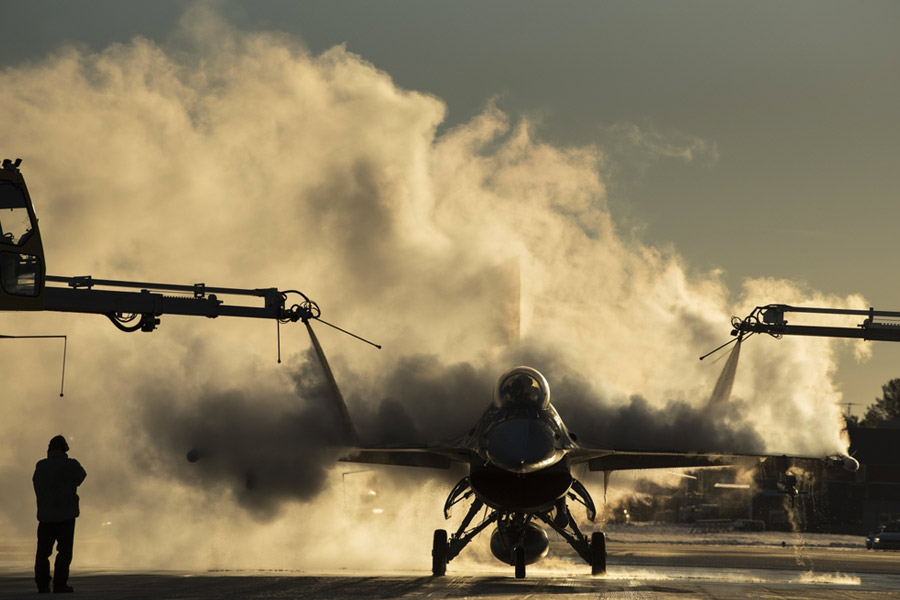US President Joe Biden ordered strikes on two facilities in Syria following attacks on US troops in the past week, the Pentagon said, warning the US will take additional measures if attacks by Iran's proxies continue.
US forces have been hit more than a dozen times in Iraq and Syria in the past week by what Washington suspects are Iran-backed groups. Hamas, Islamic Jihad and Lebanon's Hezbollah are all backed by Tehran.
Iranian Foreign Minister Hossein Amirabdollahian said at the United Nations on Thursday that if Israel's offensive against Hamas did not stop, the United States will "not be spared from this fire".
The US military on Thursday carried out strikes against two facilities in eastern Syria used by Iran's Islamic Revolutionary Guard Corps and groups it backs, the Pentagon said.
"These precision self-defence strikes are a response to a series of ongoing and mostly unsuccessful attacks against US personnel in Iraq and Syria by Iranian-backed militia groups that began on October 17," US Defense Secretary Lloyd Austin said in a statement.
Biden has sent a rare message to Iranian Supreme Leader Ayatollah Ali Khamenei warning Tehran against targeting US personnel in the Middle East, the White House said earlier on Thursday.
Israel said on Friday military raids into Gaza were preparing "the next stage of the operation", amid fears that a ground invasion of the Palestinian enclave could spark a wider Middle East conflict.
Israel has bombarded the densely populated Gaza Strip following the October 7 Hamas attack on Israeli communities. Israel says Hamas killed some 1,400 people including children, and took more than 200 hostages, some of them infants and older adults.
The Hamas-controlled Gaza health ministry said on Thursday that 7,028 Palestinians had been killed in the retaliatory air strikes, including 2,913 children.
Reuters could not independently verify the toll.
More than 613,000 people were estimated to have been made homeless and were being sheltered by the United Nations agency for Palestinian refugees, UNRWA.
Egypt's Al Qahera News, citing sources, said on Friday that a missile had struck a medical facility in the Egyptian Red Sea resort town of Taba near the Israeli border, injuring six people.
Al Qahera said the blast was related to fighting between Israel and Gaza's Hamas militants. Israel's military said it was aware of a security incident in the area.
This week, Israel said a rocket claimed by Hamas hit an area outlying Eilat, the Israeli town across the border from Taba.
A witness in Taba, which lies about 220 km (135 miles) from Gaza, reported hearing an explosion and seeing heavy smoke and dust rising.
Reuters was not immediately able to confirm the reports.
UN General Assembly
Palestinian militants clashed with Israeli troops in at least two areas of the Gaza Strip on Friday, Hamas-affiliated media reported.
Israeli military vehicles raided the central area of Al-Bureij and troops were clashing with militants near the border there, the reports said. In the south, in a border area near the town of Rafah, Hamas militants were trading fire with Israeli troops, according to the reports.
Reuters was unable to immediately confirm the reports.
As the plight of Palestinian civilians grows more desperate, the issue of whether to have humanitarian pauses or ceasefire agreements in the Hamas-run coastal enclave will come before the 193-member UN General Assembly on Friday in a draft resolution submitted by Arab states calling for a ceasefire.
Unlike in the Security Council where resolutions on Gaza aid failed this week, no country holds a veto in the General Assembly. Resolutions are non-binding, but carry political weight.
In Brussels, the 27 leaders of the EU reached a compromise declaration after days of wrangling, expressing the "gravest concern for the deteriorating humanitarian situation in Gaza".
They called for "continued, rapid, safe and unhindered humanitarian access and aid to reach those in need through all necessary measures including humanitarian corridors and pauses for humanitarian needs".
While EU leaders have strongly condemned Hamas' attack, they have struggled to stick to the same message beyond that, with some stressing Israel's right to self-defence and others emphasising concern about Palestinian civilians.
Separately, Mamadou Sow, head of the International Committee of the Red Cross' regional delegation, said from Jeddah: "To say that the humanitarian situation in Gaza is catastrophic is an understatement. Everything that is needed to sustain life is missing or dwindling by the hour in Gaza."
US sends more troops to region
Governments in the West and the Middle East are concerned about a wider regional conflict developing if Israel continues its bombardment of Gaza or mounts a ground invasion in response to the surprise attack by Hamas.
Israel and Lebanon-based Hezbollah have already exchanged fire and Israel has targeted Syrian army infrastructure and airports.
The United States has sent warships and fighter aircraft to the region over the last three weeks. On Thursday the Pentagon said about 900 more US troops have arrived in the Middle East or are heading there to bolster air defences for US personnel.
For Israel's part, Defence Minister Yoav Gallant, asked at a press conference about the possibility of a confrontation with Iran, said Israel has "no interest in expanding the war."











